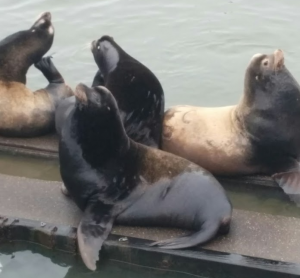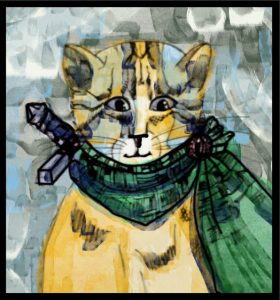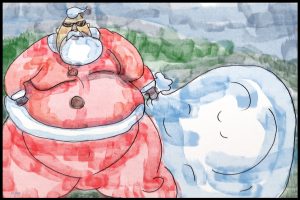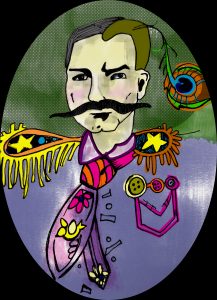“Dysmal Nitch, Sir, perfect spot to unveil the space fleet and test local stress response.”
The briefing’s cover sheet listed key facts:

- No TVs in Dysmal Nitch
- Movie theater plays only happy films
- Ignored COV-19 outbreak
- No election day turnout, unexplained
- Radio station, run from a 1987 Ford Econoline Van, town’s top media. Plays Eagles’ ’70s hits by day, Pixies at midnight.

The Major scanned the Dysmal Nitch paperwork, a nagging feeling tugging at him, but time was short—Space Fleet deployment loomed.
It was a small itch in a heap of urgent procedures.
“Bob, something’s off here. Population still 500 to 10,000?”
“Yes, Sir.”
“Monitoring areas confirmed?”
“Yes, Sir.”
“How many live there, Bob?”
“500 to 10,000, Sir.”
“Inhabited, with stores, main street, monitoring areas?”
“Yes, Sir.”
“No TVs – why? Cult?”
“Not quite, Sir. Post-COV-19, they held a town meeting and ditched TVs, figured it would protect them from infection.”
“Group decision?”
“Yes, Sir.”
“No Marxist drip, no boundary erosion, even with Internet impact on autonomy?” Bob nodded, “Interesting.”
“They added numerous community events, built a church primarily to sing hymns, offer music lessons—most play an instrument now. Retirees take kids fishing, there’s a quilters’ club, amazing cookie bakers’ group, and I love the coffee shop…” Bob trailed off, smiling. “Very resilient people, Sir.”
“Pristine enough for the test, hmm. Other sites?”
“Three, Sir, but they’re fractured—race, religion, ideology. COV-19 stress lingers, frameworks replaced, autonomy low.”
“Alright, proceed, call up the KC-135’s and begin the spraying of the biomodulating petro-chemicals and we’ll run the resilience test when they’re finished.”
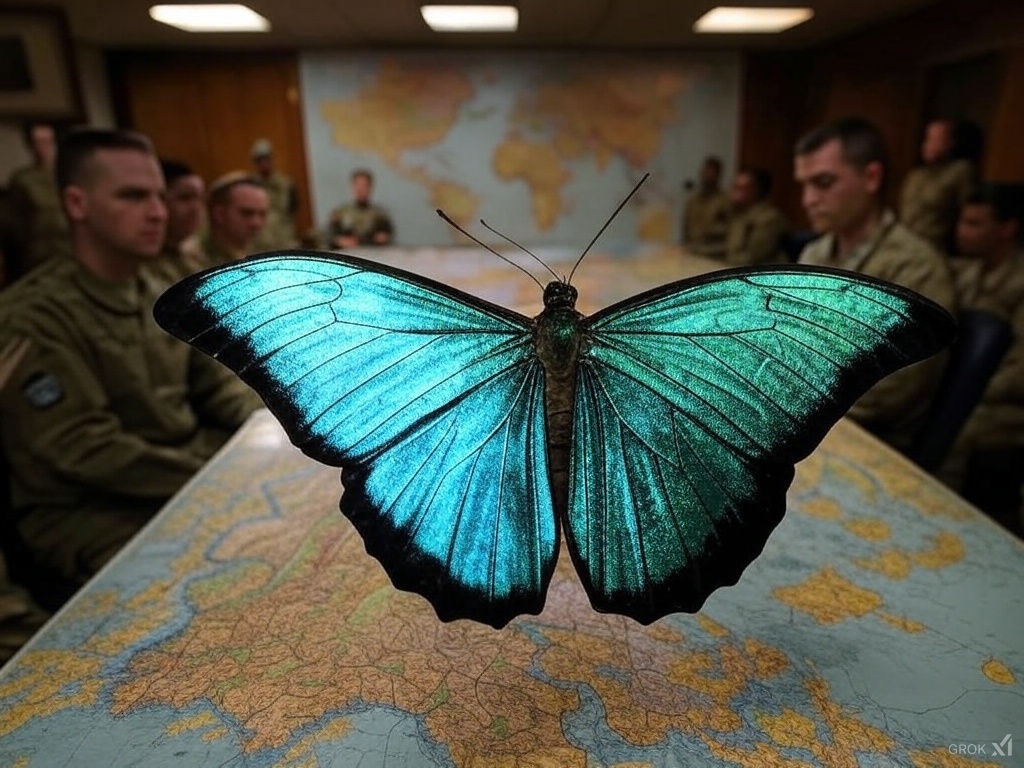
BUYING A HOUSE IN DYSMAL NITCH
The owner, Mrs. McMannon, was showing us around. My wife, Casey, was nervous—she always got jittery meeting new people—but her chatter masked it. She ducked under a railing, hopped onto a stone, and poked at seashells near a post, her usual manic energy in full swing.
“Wow, this house is amazing! That deck goes on forever, and the arbor’s gorgeous. What’s this table?”
“Butterfly raising,” Mrs. McMannon said, irritation flickering as she watched Casey. “I collect, hatch, and raise them. It’s my job.”
“Oh! A caterpillar!” Casey zeroed in on a workbench—jars, sieves, netted enclosures, yellowed notepads.
“It escaped. Don’t touch it.” Casey jerked her finger back, regret flashing.
“I’ll take pristine care of your place Mrs. McMannon – don’t worry! I’d never spray for weeds or bugs! We’ll plant tons of flowers!” Casey vowed.
A cat’s cry cut her off. A soaked orange tabby clung to a tall holly down the driveway. Before I could react, Casey bolted to investigate.
“He’s drenched!” she called to us. “Come here, big boy, trust me—don’t claw, but if you do, I forgive you.” The cat sank into her arms, claws digging into her jacket, eyes wide with terror.“You’re safe now,” she cooed, heading back up the drive.
Mrs. McMannon checked her watch, sighed. Casey looked to her for help; the older woman stared back, cold and silent.
“Yours, Mrs. McMannon?” No response. Finally, a sigh and a gesture to follow her indoors to finish the house tour.“Put him there,” she said, pointing to a kitchen floor with a kibble bowl. Ignoring us, she resumed the tour. Oak floors, I guessed—original, this house was perfect! The location on the hill meant I could finally use my telescope.
“This bedroom’s storage now,” she said cracking open a solid wood door. “Smallest room, one high window at the top but it’s blocked by boxes.”
Casey, jacket off, was swaddling the cat as she was being left behind in the kitchen sitting on the floor with the cat.
“House come with the cat?” I teased. No smile.
“Could be arranged. Here’s the attic ladder—cleaned last year, new metal roof, fifty-year warranty. Empty up there. Want to see?”
“Nah,” I said. Casey was missing the tour but I thought the country location would be perfect for her sensory overload she suffered from in the city.
Other bedrooms were basic—popcorn ceilings, paneling.
The living room opened up: high ceilings, skylights, cacti from across the country, a big couch. An electric piano sat in the corner.
“I’m learning to play,” Mrs. McMannon said, catching my glance. “If your wife likes music, we have a mandatory Sunday meeting.”
Floor-to-ceiling bookshelves lined the back wall.

“Can’t take my books at my age,” she added. “Could you keep them or donate them? I lack the resources—mentally, I mean—to sort it.”
“No problem,” I said. “Casey lives for books. Looks like you’ve traveled everywhere.”
“Worldwide, a few times,” she said, cryptic, a hint of sadness. No photos offered clues. At eighty-something, maintaining this place had to be tough.
“Eighty-nine,” she said, reading my mind. “Off to care for my infirm niece in Southern California.”
Five acres atop a hill, ringed by trees, next to public forest—no neighbors, but the road could wash out I mused. We sat by the butterfly station, overlooking a dry, debris-filled former koi pond. Time to talk price.
Casey didn’t know I’d sold my app for over a million-five, keeping some rights. I was bursting to buy her dream home in cash.
“Sure about this?” Mrs. McMannon asked dryly. “You skipped the unfinished section and basement.”
“Basement’s sealed, no leaks?” She nodded. Sunset glowed. Her tone hinted at hidden sprawl, unexplored regions of the house, but the spotless oven and solid pipes screamed meticulous care.
“Got a flight from PDX at 8 p.m., then Brussels next week,” I said. “Let’s sign and wrap up.” She agreed.
I signed, final wait pending. Casey emerged—hair wild, clothes paw-smudged the cat now following along.
“It’s a lot of work, young lady,” Mrs. McMannon said, prim as a librarian. Casey was glowing from making a cat friend and nodded happily.
“Your new friends name is Jester,” Was that a faint smile on her weary face?
THE BLOCK HOUSE
The Block House anchored Main Street’s corner—poured reinforced concrete topped by a traditional structure. Breakfast hit at 7 a.m., coffee flowed all day, black only.
Public showers lined one side, a coin laundry was adjacent, and a bike rack sat out front. Daily, folks parked bikes, queued with backpacks, showered fast, grabbed free food, and rolled on.
For the quarter of Dysmal Nitch residents living outdoors, like Park, it simplified life.
Indoors, she felt trapped, anxious, overwhelmed. Around “normal” people, she saw herself as a burden, too altered by experience to fit back into society.
She hit the Block House early, showered quick, then helped the staff scramble and serve eggs and coffee. After the early rush she mopped and restocked before leaving for her half-shift at the cannery.
Park never locked her bike; no need in Dysmal Nitch. A local elder let her pitch her tent and camp by Little Creek on his family land. Her tent collected gifts—a Pendleton blanket with a Southwest print, a dream catcher, a cook pot. She’d never felt freer or safer. People like her drifted to Dysmal Nitch to heal; if their hearts were good, the land provided.
The old Native liked Park—he saw she craved big sky. While she worked, he’d leave a blanket in her tent, trace a spiral on the outside.
Black bangs hid her eyes; she rarely spoke, avoiding contact. No one pestered her. She got by. Eventually, she came to like black coffee.
6 MONTHS LATER
Casey’s thick, unruly blond hair was stuffed under a pink ball cap decked with glittery pins. She’d biked down the long hill into town by 7:15, landing at the Block House to wait for Park.
Park barely spoke, but Casey had decided they’d be friends. Casey loved to chatter, though her outbursts—sudden as rain showers—earned her glares from folks who couldn’t keep up.
She sat at an outdoor table, sipping black coffee, scrolling photos on her phone to show Park.
“Park!” she called, waving wildly.
Park, about her age, Asian with delicate features, rolled up in her usual black hoodie and baseball cap. Casey had adopted the local vibe—her hoodie sported trees, a giant squid, and bright embroidered flowers on the sleeves.
“Park!” Casey beamed.
Park, surprised, found herself smiling. She’d never had a friend, but Dysmal Nitch was weaving her an odd little family.
“I found egg casings yesterday—butterflies laying eggs! Look, cocoon maybe?”
Casey shoved her phone at Park. It didn’t look like much. Park shrugged.
“Maybe,” she said.
Casey lit up—Park rarely said anything.
“Last night, baby raccoons showed up! Babies! And that long-haired cat’s back. Jester’s so fat now, just lounges and eats.” She scrolled through photos of the hill house. Park nodded, curious.
Park rummaged in her backpack, handed Casey a thick hardcover. “Good one,” she said. She’d been borrowing books weekly, tackling Mrs. McMannon’s old book stash.
“Whoa, you’re so smart, Park! I’d never get through these!” Park blushed, staring at her toes.
“I’ll bring you another tomorrow—something great!” Casey said.
Time ticked on; Park had work. She pulled a red bottle from her pack and handed it over.
“Gochujang. Korean hot sauce. I put it on everything. You’ll like it.”

Casey was over the moon.“Can I use it on meat?”
Park nodded.
“Noodles?” Nod.
“Anything?” Nod.
“Gotta go,” Park said, slinging her pack on.
“Casey, be careful today—weird vibe out there. No strangers, okay? They can be trouble.” She pedaled off toward the port without looking back.
Later in The Afternoon
Casey pedaled her bike up the hill, blond hair tumbling from her pink cap. She’d hit the Block House at 7:15 to see Park and was now mulling over joining the church to learn drums at Park’s suggestion.
The pirate radio van sat at the overlook. She waved inside—Jimmy, fiftyish, lanky with a beanie, grinned. “Hey, Casey! What’s the tune today?”
“Something fun—Abba?”
“On it. Headphones ready?” She popped them on, already tuned, and smiled as Abba’s ‘Dancing Queen’ began to play —”perfect, right?”
“Love it!” She shouted over the son in her headphones.
“Oh, Park gave me Gochujang—hot sauce!” She held up the bottle.
He chuckled. “Nice score. Try it on eggs, your life will never be the same. You want a full Abba lineup while you ride home?” Casey nodded enthusiastically and Jimmy gave her the thumbs up.
Casey shifted her backpack and started up the long hill to her house walking the steeper portions singing along to the radio in what she called, “cycle-karaoke.”
Casey’s legs burned as she neared her driveway, ready to coast home—until a work truck loomed around the turn, blocking her path. Its flatbed groaned as shadowy figures unloaded barrels, their edges glinting in the shadows from the large evergreen trees.
She shook off a chill.
An older man, lean and fit, stepped forward, offering a smile that never touched his eyes. Those eyes—predatory, gleaming—raked over her, calculating, like she was prey he’d pocket later as a bonus.
Ice seeped into her toes, urging her to run, but Jester’s silhouette flickered in the window—her pets, her books, her sanctuary inside.
Her husband was gone.
She was alone.
A shadow slid past the glass—someone was in her house. Her breath hitched.
She yanked her bike to flee, heart hammering, but the man had quick reflexes, seizing it. He hoisted it high, out of reach. “Hey, easy,” he soothed, voice oily. “Just a house inspection—section 13, your husband’s contract. No one was home. Didn’t mean to spook you.”
Her hands trembled and clenched. “No section 13 exists,” she said, voice quaking. “Dysmal Nitch code, section 4, paragraph 5—forty-eight hours’ notice. You need a warrant. You’re trespassing.”
His smile stretched, a predator baring teeth, demeanor darkening. “Your home, huh? We decide that. Cooperate, or you might lose it.” The threat coiled tight.
She shook harder, rooted.
“Need your phone,” he said, casual, eyes glinting. “No signal up here.”
“Sure,” she rasped, lips dry, dread pooling. She handed over her decoy—an old iPhone—her real one hidden in her backpack, a trick she had read about and adopted from a popular Japanese manga. “Battery’s low,” she said handing over the small old phone.
“Dead,” he said, relief flashing as he pocketed it. It was a strange phone but no odder than the owner in the kraken pattern hoodie and giant earrings he mused.
“Sit under the arbor. We’re almost done.” His tone sharpened, a command.
She turned, putting her hood up, pulse racing. He tossed her custom bike—her perfect, twelve-pound lifeline—like garbage to the ground beside the driveway.
Fury sparked as she went to sit at the old butterfly work table. His gaze bored into her as she took off her backpack and pulled water and cashews, hands unsteady.
She felt him relax as she set them down, sipping and eating after the climb. In her left hand, she palmed her real phone, flicking the do-not-disturb to on. As they turned away, she fired texts:Husband: Trouble. Police. NOW.
Park: Weird people. Help. Police. NOW.
A figure melted from the shadows, voice low and probing. “What’s this? Calling for help? We’re just working.” His eyes narrowed, searching.
She palmed the phone making the swap when she opened her hand it held hot sauce. She forced a grin, voice tight. “Gochujang—spicy, tangy, great on cashews. Try some?” The bottle shook in her grip.
He paused, menace flickering. “How spicy? Jalapeño? Ghost pepper?”
“Serrano, maybe—full kick.” Her words rushed, brittle.
He leaned closer—then the older man barked, “Pete, drop it! Planes are up!”
Pete muttered, “Checking for a phone.”
“Got it, Pete. Robes on, substance out—planes are close.”
Casey dryly ate cashews that seemed to stick in her throat each time requiring a big gulp of water. The men worked quickly staring up at the sky. The roar of military planes were overhead slightly louder than a 747 she mused. She wondered how long it would take the police to arrive.
A man in black robes detached himself from the group, she thought she heard mutterings like, “how did they know? How many cars?” and “I’ll take care of it.”
A rustle sliced the silence. A hooded face—ball cap, finger to lips—peered from the bushes. Park. Casey’s heart leapt, dread and hope crashing together. Her message had been received.
Petroleum
Grey Stratotankers circled overhead, seeding the sky with graphene, aluminum, and Caesium-137 particles—lay lines for something big. The ground crew had to move fast before the fleet arrived.
The team swept the house—no TVs, as expected. In the workshop, a Synology DS1522+ 5-Bay NAS hummed, expanded to 200TB. Notes pegged the husband as a tech guy; the wife—barely a footnote—might have a physics master’s. Odd gaps in the brief, but her social media was a ghost town. To them, she didn’t register.
The older man, wiry and fit, prowled the husband’s shop, vintage relics fueling a surge of venom. Nerds like this—untouched, unbowed—begged for a reckoning. He pictured the husband returning to ruins, broken, his wife a sweet perk. His lips twitched.
Casey fidgeted under the arbor, snapping sticks to steady herself. Park was in the bushes and would whisper “it’s okay Casey, hang in there.”
A rustle in the thick Salal caught the Man’s eye and he began to walk towards Casey whose heart stopped, had he seen Park?—then a barrel crashed off the truck, splitting on the driveway. Black ichor oozed out, greasy with a green-rainbow sheen, alive and escaping. Casey flinched; Park, hidden, tensed.
“Damn it!” the man snapped, panic edging his voice. “Guide it to the sanctified reservoir—now!” The crew scrambled, chanting low and rhythmic.
The cleaned-out pond gleamed like a shallow bowl. The hum grew, the sludge quivering, snaking toward the basin in an undulating wave. The man shaped it from a distance, hands trembling, sweat beading.
No meds, no prep—just raw skill keeping it from spiraling bad. Nausea hit him. One slip-up, and he’d be groveling for this.
Casey froze, fear numbing her. What was that gunk? A wave of evil and horror washed over her – it was alive wasn’t it?
A hand slipped through the bushes—Park’s—squeezing hers before vanishing, “this is bad, the police should have been here by now. I’ll go for help.” She whispered taking the chance as the men’s full attention was on the rank ichor now purposefully and slowly filling the Koi pond.
Park bypassed most of the road until she felt like she wasn’t being watched then ran for all she was worth. She didn’t have a plan, she had seen the cop cars sitting near the driveway and the perfect quiet of them made sick inside. She skidded on the gravel as she saw the radio van parked in the pull out.
She knocked frantically on his window trying to catch her breath, “Jimmy, cultists are at Casey’s. She’s trapped. Planes are up—they’re making contact.”

He nodded gravely.
“Get in!” He told her and motioned to the side door. “I saw the police go up earlier and have not seen anyone return. I’ve been worried.”
He cut “Hotel California” mid-riff. “For those in the Dysmal Nitch response team, we have a substantiated report that Satanic cultists are back. Holding Outlook Hill trying their old tricks of thought control through microplastics and macro petroleum, same as last year. You know what to do.
“96 Tears” by The Stranglers kicked in—high alert. Listeners would know: trouble was here.
The Police No Luck
Casey’s husband dialed the police—local, county, state. Dead air every time, no calls were going through.
A stone of dread sank in his gut, 16 hours ahead, halfway across the world – he should not have left Casey alone.
Seven cop cars screeched to the driveway’s end, lights flashing, piling up behind a plain wooden barricade.
A lone trooper in a fluorescent vest stood guard, baton tapping his palm in a steady, eerie rhythm.
“Let us through!” the first cops yelled.
“Can’t,” he droned, voice flat and hypnotic.
“No authorization.”
They argued, but their words twisted, garbling in their own heads—intelligible to them, nonsense to anyone else. New arrivals shouted, “What’s happening? Let us pass! What’s wrong with Fred?”—then fell silent, convinced they were still talking.
From above, they’d look like statues, mouths moving, eyes blank.
Overhead, Stratotankers had laid down thick trails that turned to clouds and thickened the sky and dropped in a black haze on the once-clear day.
Jimmy in his van was plugging in a series of cables enabling his ham radio and local direct broadcasts. “I hope the residents remember what they learned in Wednesday language club huh?” Park nodded, “I’m glad you’re here because I was afraid of trying to pronounce the codes, Park smiled.
“실례합니다, 가자!” she said, slow and deliberate. The cultists might eventually catch on—analog was the Dysmal Nitch edge but they would be in a hurry and since Park ran Wednesday’s language exchange, they’d cloak directions in both Korean and Navajo languages.
She signaled Jimmy. “Black Pink or BTS?” he asked.“Chung Ha—‘Stress,’” she replied. He nodded, cueing it up.
At the Block House, the music shifted and Park’s voice signaled the plan’s next move. Tension hummed—action was live. Drones, drums, and holy water was heading up the hill.
In The House
Casey snatched her backpack and bolted inside, screen door banging shut. The chanting men barely flinched—black robes with cowls covering their heads, focus unbroken.
She was trapped anyway, nowhere to run.
The house sprawled oddly—unfinished basement and attic quirks jutting out like half-baked dreams, tacked onto the normal core where she spent all her time. Casey avoided those unusual parts; the main house was plenty.
Now, clutching Jester the orange tabby, she darted through the maze of hallways and rooms, seeking a weapon or hiding spot. She yanked down attic stairs, shoved Jester up, and scrambled after him, hauling the steps closed. The attic floor was solid, but the roof crouched low. Dim light seeped through small windows at the ceiling. She scurried to a half-sized door with a brass handle.
It swung open into a vaulted chamber—high, pointed ceiling looming. She froze. The chants drifted up, faint but insistent, mingling with a buzzing hum—maddening yet lulling. Her thoughts blurred; exhaustion tugged. Where was she going?
Long narrow windows poured in an ugly red light like a forest fire or sunset before a storm.
A bare wall faced her, pristine, tracing the roof’s peak. She stared, entranced. A square emerged—18 inches, red-framed. Like a children’s theater box. Shapes flickered inside. She squinted. They moved.
“Sock puppets,” she whispered. Button eyes glinted—three of them, staring back.“You must be lonely up here,” she murmured. “I didn’t know you were here—house spirits, right? I’ll visit, sing, dance, play music for you every day.”
Her eyes stung, unblinking, tears welling unnoticed.The puppets twitched.
“YOU. YOU. YOU. YOU!” Their voices rasped, sharp.She frowned. “What?”
“YOU LEAVE. YOU WILL LEAVE. WE HATE YOU. DISGUSTING. LEAVE!”
The words stabbed, venomous, echoing in the dim. Tension coiled tighter—something was wrong here.
“YOU LEAVE. YOU WILL LEAVE THIS HOUSE. WE HATE YOU. YOU YOU YOU. YOU ARE DISGUSTING. LEAVE!”
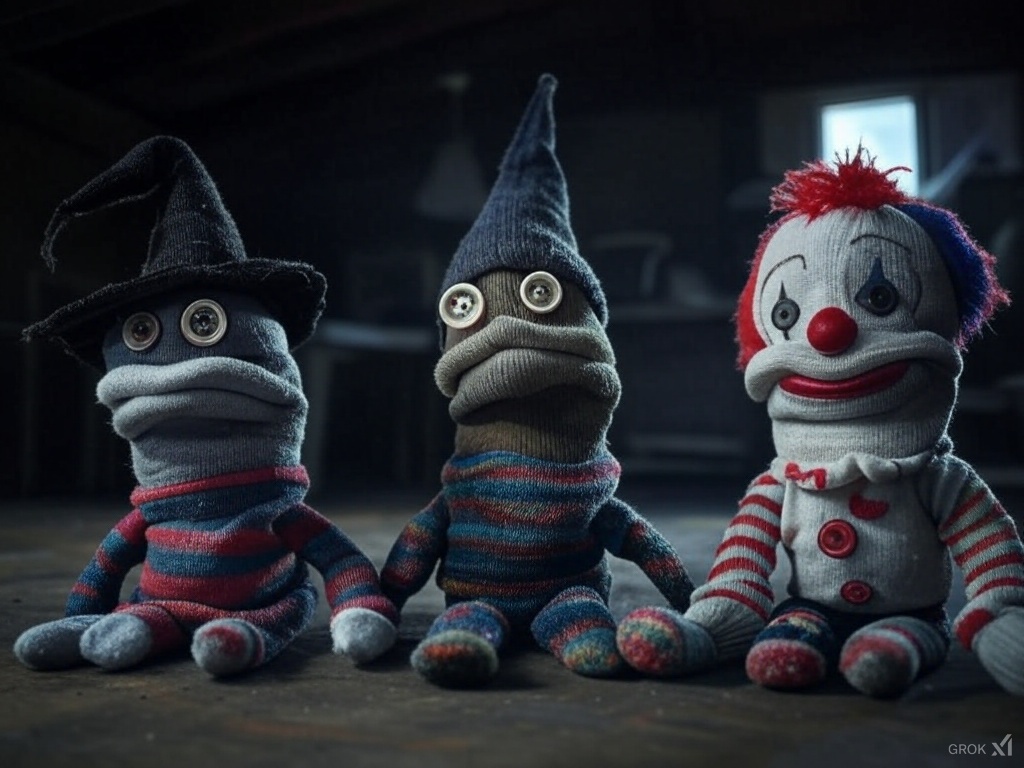
A faint, dreamy voice—her own?—whispered, “They might be demons. That’s a shame.” Nausea twisted her gut, dizziness spinning her head. An acrid chemical stench crept in, sharp and toxic, pinning her in place.
“DIE. YOU DIE!” the puppets screeched, their voices jagged.
“Why don’t they like me?” she thought, wistful. “They don’t even know me.” Memories of past attacks surfaced—misunderstood, ambushed. Were those people tied to these things? It seemed familiar but had it really happened? Her eyes fluttered, knees softening as the thought drifted.
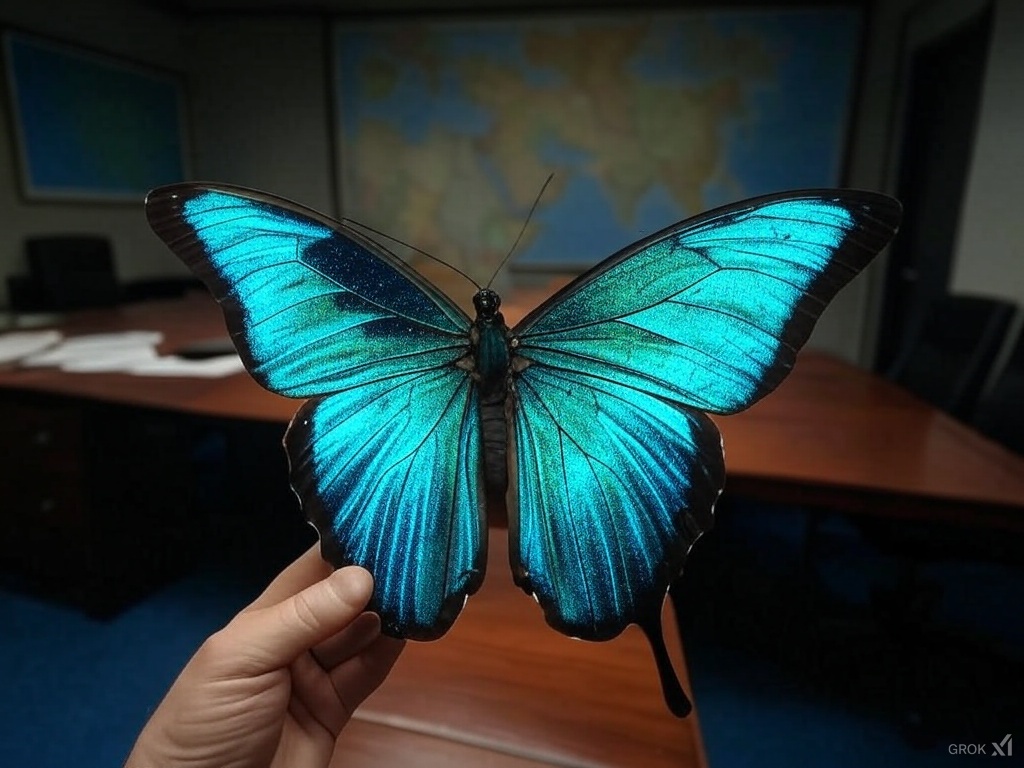
Jester’s teeth sank into her leg. “Ouch!” She jolted, gasping. Smog choked the room, air thinning fast. A jeweled butterfly—Papilio glaucus—flitted by. She stumbled after it, drawn to a far wall where a door creaked open to a rusty spiral staircase. Fresh air hit her lungs, clearing the haze. The chanting faded, distant now, but the unease lingered.
The Highway
Nic had been bringing back his uncles thick sack of medications back to the reservation when the truck coughed and died mid-highway. He jabbed the hazards—nothing. Panic spiked as he scanned the mirrors, heart hammering.

A car cresting the hill could plow into his flatbed truck any second, he had no time to waste getting it off the fast moving highway. He glanced in his mirrors and froze, breath snagging. The road ahead didn’t matter anymore.
Every vehicle into Dysmal Nitch had stalled dead.
Silver ships hovered low, too tight, too close—triangles, spheres, a boomerang with no edges, drifting as one. Weightless, silent, they blotted the sun. Static prickled his skin, a hum vibrating deep. His arms burned like a sunburn; his breath fogged in the sudden chill.
Nic’s radio turned on by itself crackling a thick static—Korean snippets, then static, then silence. Nic exhaled hard, fumbling in the glove box for his medicine bag. He slung it around his neck, then hopped out, eyes averted from the sky. From the toolbox, he grabbed a feathered staff, tied on his roach headdress, leather cord taut under his chin.
Orbs pulsed overhead, lights searing. Drivers gaped, frozen staring up. “Don’t look up!” Nic yelled, voice raw. “Not the lights—get in your cars! Pass it on!” A guy nearby nodded, relaying the warning but most were long past hearing it.
Nic leapt into the truck bed, prying open a crusty can of white paint with a screwdriver. He shook it, dipped a finger, and smeared a spiral atop the truck cab, chanting low. Symbols marked all four sides, then two streaks across his face. Medicine set, the engine could once again fire—it roared alive—and peeled toward the Block House, where his tribe and uncle’s people would be waiting, braced for whatever came next.
Uncle Wally
Nic’s truck rattled up, horn blaring sharp and sour. The old man gripped his ceremonial stick—half staff, half crutch—and shuffled fast, grunting as he hauled his 93-year-old frame into the flatbed. His bones ached, long past weary, craving the ancestors’ rest. But maybe this was why he’d been spared so long. The young ones were in deep—their fight was his now.
The House
“As above, so below!” The chant pulsed through ozone-thick air, bitter and heavy. Casey’s fear spiked—she didn’t know it could cut this deep.
The air itself seemed to relish her terror, feeding on it. Jester squirmed in her frantic grip. Dark clouds churned, fog coiling tight, threaded with green electric flickers—like worms thriving in the murk.
She fumbled for her headphones, slamming them on, cranking BTS to max. Park’s touch—Korean beats flooding the static. Joy flared, sharp and defiant; the fog recoiled, sourly thwarted.Park’s voice broke through, weaving Navajo and Korean—emergency code they’d drilled. She nailed Navajo, honed at the fish plant with tribal folks who traded her Korean lessons for theirs. Casey clung to it, a lifeline in the haze.
As Above So Below
Silver orbs descended, lights glittering, but the chanters—entranced around the black ichor—didn’t flinch.
“Surrender your humanity!” the old, fit man urged his acolytes. “Let the ichor take your soul, your body—become more! Power, eternal life, dominion over all!” Pete wavered, a sour itch crawling up his neck. This group had sickened him from the start, their promises a lure dragging him deeper—bliss, energy, confidence always just ahead.
“You’ll never sleep, strong as a bear, money pouring in, women at your feet—how many do you want?” the leader crowed.
“Our Lords thrive in the ichor, feeding on hate, pain, cruelty. Generous Lords of secrets—any wish granted! They inhabit the plastic choking this world, microplastics in every human cell, fueling consumption, swelling their reach!” His laugh grated.
“Satan’s lies, Pete,” a faint voice cut through—Grandma? Pete’s chant faltered. The old man glared, smug; Pete would be shredded soon anyway.
“Focus, Pete! Revenge on those who mocked you? We’ll command their shiny new ships—fools who did not know they built the fleet for our Lords!”
“Pete, God loves you. I love you.” Grandma’s voice again, soft, piercing.
He shed his robe. “Grandma, where are you?” Fog thickened, ozone stinging, electric zaps crackling around him. He flailed through it. “Grandma?”
“You’re enough, Pete. Go help that girl.” Her words guided him—to Casey, rocking, eyes clenched, headphones blaring, cat thrashing in her grip. Pity hit him. He took her elbow. “I’ll get you out. Keep your eyes shut—down the driveway.”
She followed, blindly trusting. Past the chanters, past the barricade—no one stopped them, as if they’d vanished.
A truck rumbled up. A blue-green butterfly flitted by; the air cleared, sharp and clean. Pete gulped it down, realizing how shallow his breaths had been—weak, sick, suffocating among them.
Men drummed in the truck bed parked outside the barricade. Their first job was to release the officers and clear the road for the others. An old man beckoned to Pete. “Climb up.” Pete shook his head—tainted, unworthy. Wally gestured harder. Pete hauled himself in, grabbed a stick, and pounded the drum, syncing with the rhythm. Wally sang, voices rising, steadying him.
Park hugged Casey. “You okay?”
“Wall puppets… they hate me,” Casey mumbled.
Park frowned. “Hungry ghosts,” she said, voice low, knowing.
The Star Ships

“Sir, we’ve got a problem—malfunctions in twenty-one of twenty-nine craft. We need to abort,” the Lieutenant said, voice taut.
“Come again?” The Major’s calm held, but disbelief flickered beneath.
“Ground interference, Sir—one frequency’s jamming our AI on the mothership, cutting comms. Another signal’s countering it acoustically, with something layered in we can’t ID.”
“Impossible, Lieutenant. Repeat that.”
“Unknown ground sources disrupting twenty-one ships. Recommend aborting to analyze,” the Lieutenant pressed, urgency rising.
“These ships deploy in three months world wide,” the Major said, steady but edged.
“Yes, Sir—and three are offline. I’ve lost them. Ground comms are linking now, sending ‘back to base directive.’”
“Sir, we’ve got data from the stress test despite the malfunctions and I think you should see this,” the Lieutenant added, a spark in his tone.
“Report.”
“Locals didn’t panic—they’ve mounted a defense. Tech we don’t recognize, and ours is being hijacked. Systems compromised, AI overwritten with new directives—Sir, it’s in a language I can’t parse. Babylonian?”
“We’ve lost control,” the Major said, grim realization settling.“Yes, Sir. If this holds, we might not recover the fleet, although it appears they have begun to be recalled on the ‘back to base’ directive.”
“Scramble F-35s to escort the fleet home. Abort the mission. Deploy 389 tactical to intercept whatever the hell is down there messing with our fleet, and make sure they take the exorcists.”

ANALOG SPIRAL
Casey’s husband rolled in late, two days after the chaos, greeted by campfires dotting the front yard.
“They kept me safe and watched the house ‘til you got back,” Casey chirped, wrapping him in a tight hug. “They’ve taught me stories—did you know an owl lives in the Alder tree? Wally says it’s a guardian. He’s amazing, but he left—his heart’s weak. His nephew’s here, though,Nic, he’s training to be a medicine man. He’s so cool!”
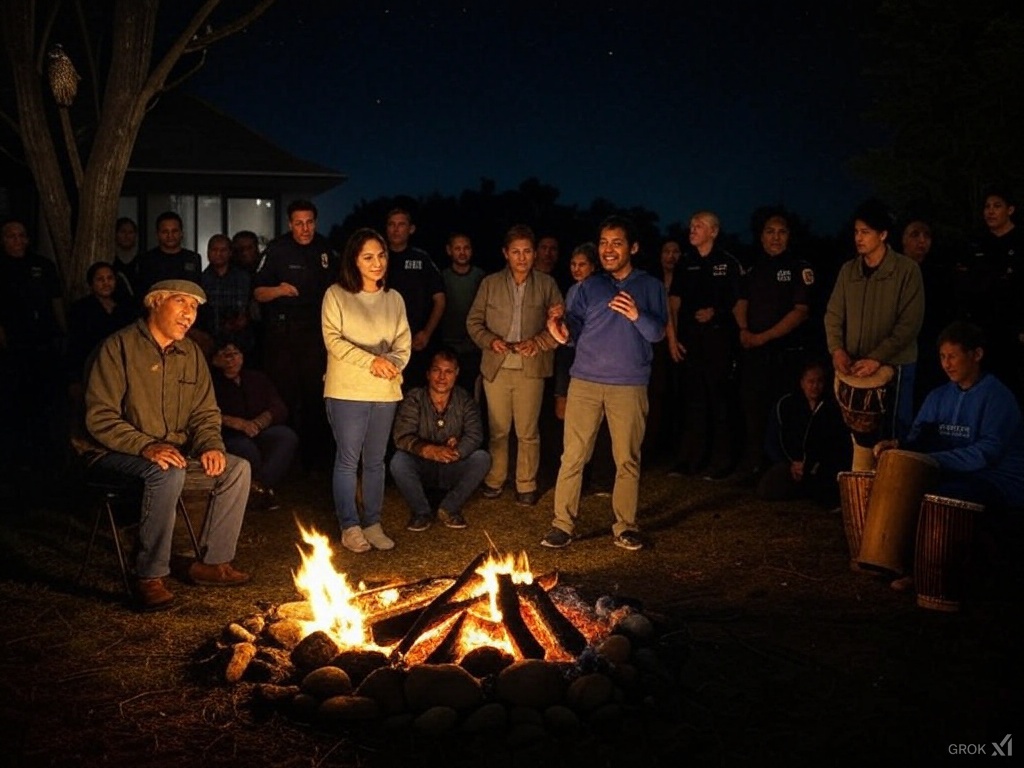
“Casey,” he laughed, “I leave, and you’ve got a tribe camping out front?” Drums kicked up, and she did a little skip-dance.“I learned straight dancing!” she beamed. “Park’s been crashing here, cooking, keeping things rolling. We’re planning a full-moon ceremony for the koi pond.”
He glanced at it, curious. “Oh, no—don’t look!” it’s still dark magic over there.
“Whose van?” He nodded at a vibrant ‘80s rig with a big antenna.
“Jimmy’s! Our DJ—he runs the local radio, he’s visiting taking a break.”
“Two cops are posted up, and the Sunday music ladies are dishing corn soup,” she said, grinning.
“And the drumming?”“Just the heartbeat of it all!” She grabbed his hand, pulling him toward the glow. “Come meet everyone!”

End of Action Report: Top Secret
Project Crimson, unleashed with COV-19, stacked its goals: train the masses to obey in chaos, erode individual will for centralized rule, and drown reason with fear, shoving the Overton window wide open.
Public and online resistance met brutal, lopsided retaliation—unwinnable by design. AI calculated three to four years of relentless hardship would prepare humanity for galactic war. When the galactic ships were launched and the war begun instead of panic and mass chaos there would be a population bored with yet another demoralizing inconvenient obstacle and the aliens would be met more with “so what” then the fear they could feed upon.
The aliens had their plans, seeding plastics and hijacking old dark-magic cults tied to military clout. Microplastics and aerial nanoparticle sprays—their prep for invasion—fattened the air and blood of humanity. The mystery schools, eager pawns, preened for their shadowy lords, certain of rewards.
Yet Dysmal Nitch flipped the script. Their defiance—raw, clever, communal—foiled the test, costing billions and exposing the rot. The aliens misjudged; the cults overreached. AI faltered, and the Nitch stood tall a quiet triumph over cosmic meddling.
the end
EPILOGUE – GENERALS OFFICE:
- Get the population used to obeying orders in a constantly shifting uncertain situation.
- Convince the population to give up individual sovereignty to a central authority
- Tailoring fears for a variety of audiences and pushing news well past the Overton window overwhelming the reasoning part of the brain. At all times the situation needed to feel unwinnable and all resistance needed to be met with an asymmetrical violent response completely out of proportion with the stated offense.
- AI deduced that it would require three to four years of severe hardship and constant threat of worsening hardships to immunize the public against the coming galactic warfare.
- Public was impregnated with three styles of petroleum carbon graphene products to help bio-modulate them towards easier global control as a defense against invader control.
- The graphene turned out to increase efficiency of direct control but decreased people’s over all ability to think and react effectively. Unintended consequence came from lack of data on hostile fores.
- The STRESS-TEST was to see how non-conforming people would react to alien craft they had not seen before. Ships were deployed to Dysmal Nitch.
- The STRESS-TEST should be classified, dismissed and Dysmal Nitch should be off limits to all military for the next 150 years.
- See attached list of malfunctions and tabulated costs.
- AI failed on 32 of 40 predictions of the human reactions, see appendix 5 provided by StakeDeepAI
- Recommend open investigation of the sub-operational forces at work within our military with ties to mystery school religions and how they have burrowed into the system and are a critical liability for any further deployment.
- Images are generated via GROK 3 Beta
- No AI was used to write this story, AI edited grammar
- I know this story makes no damn sense. lol


